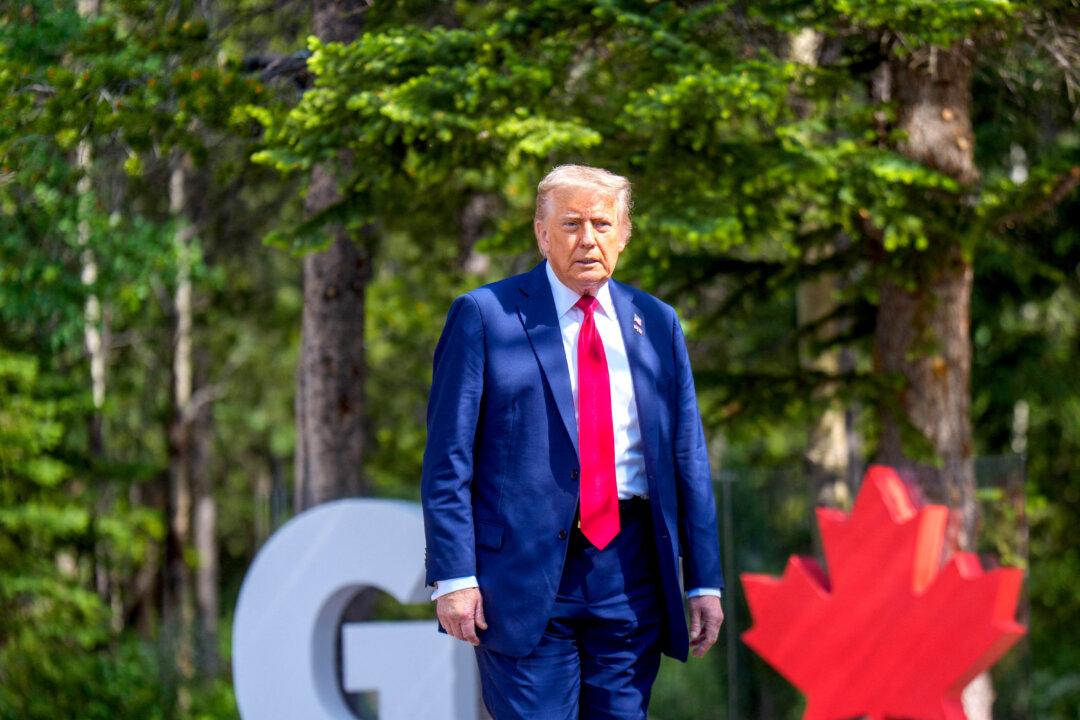CALGARY, Canada—President Donald Trump left the G7 summit on June 16 earlier than planned, opting to be in Washington to focus on the ongoing conflict between Israel and Iran.
“President Trump had a great day at the G7, even signing a major trade deal with the United Kingdom and Prime Minister Keir Starmer. Much was accomplished, but because of what’s going on in the Middle East, President Trump will be leaving tonight after dinner with Heads of State,” White House press secretary Karoline Leavitt announced on social media platform X.
Trump told reporters after he and other leaders posed for a group photo at the G7 summit: “I have to be back.”
“You probably see what I see, and I have to be back as soon as I can,” he said.
Aboard Air Force One en route to Washington on June 16, Trump commented further on his early departure from the G7 summit and his views on Macron.
“That was Emmanuel, nice guy, but he doesn’t get it right too often,” Trump told reporters, reiterating his goal of achieving an outcome “better than a cease-fire” in the Israel–Iran conflict.
He said he would be in the Situation Room early Tuesday morning. On why he cut his Canada trip short, he said he preferred avoiding phones.
“I don’t believe in telephones, because people like you listen to them,” he told reporters.
Clarifying his objectives, Trump said he sought “a real end, not a cease-fire,” later describing it as a “complete give-up” by Iran.
Trump’s abrupt decision to leave the summit echoed his first term, when he left the 2018 Charlevoix, Canada, summit early. That meeting ended in discord over trade disputes, with Trump refusing to endorse the joint communiqué. This time, the White House cited escalating tensions in the Middle East as the reason for his early departure.
Trump praised the G7 summit’s progress on Monday, stating that the leaders had “got a lot done.”
“I wish I could stay for tomorrow, but they understand,” Trump told reporters.
Canadian Prime Minister Mark Carney thanked Trump for attending and told reporters that he fully understood the president’s decision to leave early.
Following the group photo, Trump joined other leaders for a dinner before departing for Washington.
Trump issued a stark warning earlier to Iran via a Truth Social post and called for the immediate evacuation of Tehran as Iran and Israel continue to exchange airstrikes.
During the first day of G7 meetings, member nations proposed a joint statement advocating for de-escalation in the ongoing Israel-Iran conflict.
Trump commented on Iran on the sidelines of the G7 after his bilateral meeting with UK Prime Minister Keir Starmer.
When asked if Trump endorsed de-escalation, Trump said, “A deal will be signed, and I think Iran is foolish not to sign one.”
When pressed on whether the United States would refrain from military involvement, Trump sidestepped the question.
“As soon as I leave here, we’re going to be doing something. But I have to leave here. I have, you know, this commitment. I have a lot of commitments,” Trump said.
When asked about supporting regime change in Iran, Trump reiterated his primary objective: “I want to see no nuclear weapon in Iran, and we’re well on our way to making sure that happens.”
Several Israeli media outlets reported that U.S. fighter jets had participated in airstrikes on Iran. The White House denied these reports.
“This is not true. American forces are maintaining their defensive posture, and that has not changed. We will defend American interests,” Alex Pfeiffer, White House principal deputy communications director, said on X.
Secretary of State Marco Rubio also returned to Washington with Trump.
This is a setback for Zelenskyy, as the United States is a key player at the table, Paul Samson, head of the Centre for International Governance Innovation, a Canada-based think tank, told The Epoch Times.
It’s uncertain whether the summit would have yielded a breakthrough, as any decision also requires Russia’s agreement, Samson noted.
Still, the Ukraine war has been overshadowed by the Israel–Iran conflict during the G7 summit, he said.







